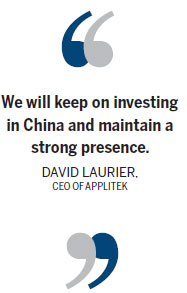Chinese economy: Down but not out
Updated: 2015-09-11 07:31
By Fu Jing and Gao Shuang(China Daily Europe)
|
|||||||||||
|
Chinese investors at a China-EU investment fair in France. Provided to China Daily |

Zhang Haiyan, director of Neoma's Confucius Business Institute, says: "Yet, there are true worries in China, but I don't think we need to be panicked; compared to industrial or other emerging countries, China is still performing quite well."
China's achievements in past decades, especially the tangible and intangible resources and assets that it has accumulated over the years, provides a solid base for its future development, says Zhang.
Existing manufacturing facilities, efficiency in large scale production, relatively good communication and transportation infrastructure, potential market size, growing middle class, engagement of multinational companies, dynamic entrepreneurial businesses, which he calls China "factors", have not vanished.
Zhang says the bad news from China and its impact on Europe might be rather short term and psychological and looking at the global scale, companies in the European Union still consider China as their top destination in their investment decisions and they continue to strengthen their market position in the Chinese market.
David Laurier, CEO of AppliTek, an environmental application company in Belgium, says China still has a good growth rate, despite the plunges in the stock market and foreign exchanges.
"I am confident about this market because there is a huge need to improve environmental conditions for the people," says Laurier.
"We European businesses have to react to the new challenges in the market."
China's economy will be slowing down further in the coming six months but it will pick up after that, he says.
"We will keep on investing in China and maintain a strong presence."
Niels Christiansen, CEO of Danfoss Group Global in Denmark, which produces machinery and services, says China is in the process of changing its society and that the Chinese economy has entered a new phase that is different from the high-speed growth pattern exhibited in the past. It has a new trend that features more sustainable, mid-speed growth with higher efficiency and lower costs.
As to the recent economic turmoil, Christiansen says: "We have a strong and very well-established business in China and, as everybody else, we of course follow the development closely. We are active in many different business areas and sell our products to many different customers in many different sectors."
As for the depreciation of the yuan, Christiansen says his company's cash flow exposure against the yuan is neutral as it has a good balance of imports and exports, which means the depreciation does not have a direct effect on them. "We hope that it can help strengthen Chinese competitiveness and this way stimulate the Chinese economy. Stronger Chinese growth is also positive for Danfoss," says Christiansen.
Zhang Haiyan says such a rapid and important depreciation of the yuan was not expected, which could have some short and long-term impact on the economic relationship between China and the rest of the world.
"With regards to the EU-China FDI and trade relations, the depreciation of RMB might negatively affect European exports to China and inbound tourist flows from China to Europe," says Zhang.
"It could also increase the costs for Chinese companies to invest in Europe."
Verhasselt, from Liege Airport, says he takes a long-term view of the stock market, not a day-trader view, and that the Chinese market remains interesting.
"Of course it needs some regulations. All investors, corporate and individual, should respect the stock exchange for what it is, a financial institution and trading platform, not a casino," he says.
Christiansen of Danfoss says the Chinese stock market is quite volatile and this trend will probably continue. "However, it is not something that affects our business directly," he says.
Zhang Haiyan says China's stock exchange has rarely reflected the health of the Chinese economy since its establishment.
"The recent ups and downs are more linked with the speculations and opportunistic behavior of investors. Yet, the plunge of the stock exchange could create panic for many small and individual investors who often belong to the middle and emerging class," says Zhang.
"The loss of money and especially the loss of confidence might in the short term reduce the consumption of this group of consumers, especially for durable and luxury goods."
Contact the writers through fujing@chinadaily.com.cn
Today's Top News
UK nuclear industry has high hopes on Chinese investment
Greek leftist Tsipras returns in unexpectedly decisive vote win
Young people from US look forward to Xi's state visit: Survey
Thirteen migrants killed as boat is wrecked off Turkish coast
Sino-French fund to invest in markets worldwide
For marathon runners, it's time to shine
Refugee crisis to test EU at summit of divided leaders
Japan enacts new security laws to overturn postwar pacifism
Hot Topics
Lunar probe , China growth forecasts, Emission rules get tougher, China seen through 'colored lens', International board,
Editor's Picks

|

|

|

|

|

|







